
Meet Hopkins engineer and INBT researcher Stavroula Sofou tomorrow at our next Women in Cancer Research seminar. You will want to learn about, “impenetrable Tumors and Untargetable Cancers: Engineering Nanocarrier Surfaces to do the (Apparently) Impossible.” #CancerResearch
Test to link.

Cognitive impairment is a core feature of many psychiatric and neurological disorders. Currently available therapies do not significantly improve cognitive impairment. Dopaminergic neurotransmission in the prefrontal cortex is important for the regulation of cognitive function and therapeutic interventions that modulate dopaminergic function in the cortex could improve cognition. The enzyme catechol-O-methyltransferase (COMT) is a key regulator of dopaminergic tone in the cortex and hippocampus and individual variability in COMT function is associated with differences in cognitive function. Tolcapone, a COMT inhibitor, has been approved as a treatment for the motor symptoms of Parkinson’s disease but it has multiple features that prevent its widespread use as a cognitive enhancer including poor pharmacokinetics (PK) that require 3X/day dosing in patients and a black box warning for potentially fatal liver toxicity. Carr’s team developed non-nitrocatechol, COMT inhibitors with improved PK and safety profiles compared to tolcapone. They will describe multiple novel compounds with promising preclinical in vivo profiles that may be suitable for clinical trials testing their cognitive enhancement capabilities.
The Summer Seminar Series is co-sponsored by PS-OC and the Institute for NanoBioTechnology.
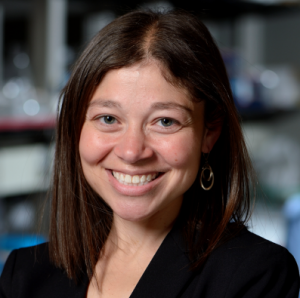
The repertoire of naturally occurring proteins is limited and many molecules induce multiple conflicting effects. Protein engineering affords researchers the unprecedented capacity to create new molecules with novel and therapeutically useful activities. Researchers have traditionally taken an unbiased approach to protein engineering, but as our knowledge of protein structure-function relationships advances, we have the exciting opportunity to apply molecular principles to guide engineering. Leveraging cutting-edge tools and exclusive expertise in structural biology and molecular design, the Spangler Lab implements a unique structure-based engineering approach to elucidate the determinants of protein activity and inform drug development. Building on molecular insights, our group aims to redesign existing proteins and engineer new proteins to serve as targeted therapeutics to treat immune diseases such as cancer, infectious diseases, and autoimmune disorders.
The Summer Seminar Series is co-sponsored by the Physical Sciences-Oncology Center and INBT.
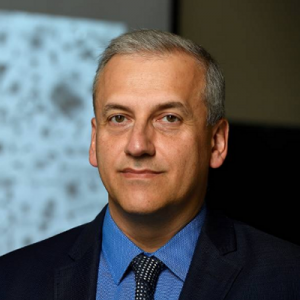
Zeolites are microporous framework silicates that are used widely in the chemical industry as heterogeneous acid catalysts, efficient ion exchangers, selective adsorbents for gas separations and as perm-selective dehydration membranes. They are also useful in other applications like water softening, as desiccants, and for adsorptive/catalytic treatment of automotive emissions. Zeolites have a wide range of compositions, and Dr. Tsapatsis’ will focus his talk on pure silica zeolites (zeosils) and high silica zeolites, i.e., zeolites with large ratio of silicon to substituents like Al, B, Ge, Sn, Ti that isomorphously replace silicon in the tetrahedral sites of the zeolite framework.
Michael Tsapatsis’ research group and collaborators have devoted more than two decades to study zeolite nucleation and crystal growth in efforts to create (i) nanometer-thin, oriented, and pinhole-free separation membranes, and (ii) hierarchical porous adsorbents and catalysts.
The Summer Seminar Series is co-sponsored by PS-OC and the Institute for NanoBioTechnology.
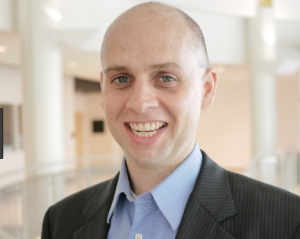
Jewell’s research combines immunology and biomaterials to understand the interactions between synthetic materials and immune tissues, and to design more selective therapeutic vaccines for cancer and autoimmunity.
Jewell will discuss new degradable polymer depots that could improve the selectivity of therapies for autoimmune diseases such as multiple sclerosis and diabetes by locally reprogramming the function of lymph nodes – tissues that coordinate immune function. Jewell will also discuss self-assemble immune signals into modular nanostructures.
The Summer Seminar Series is co-sponsored by the PS-OC and the Institute for NanoBioTechnology.
Traveling the Long Road to Clinical Translation of Tissue Engineered Bone Grafts
Treating large craniofacial bone loss due to congenital defects, trauma, or cancer resection remains a huge clinical challenge. Approximately 200,000 fractures require bone transplantation annually in the US at the cost of $2B. Tissue engineering, where the patient’s own cells are combined with porous scaffolds to guide their development into new bone tissue, provides a viable means of obtaining ‘autologous’ bone grafts for the treatment of large bone defects. Successfully applying tissue-engineered grafts, however, requires overcoming key scientific, regulatory, and practical hurdles. To address these, Warren Grayson’s lab has focused on the development of a point-of-care stem cell-biomaterial based strategy for treating massive craniomaxillofacial bone loss.
In his talk, Warren Grayson will outline novel technologies and strategies they are developing to advance the bone tissue engineering field with consideration for the regulatory and practical concerns. He will also describe ongoing studies intended to move us closer to realizing human clinical trials.
Learning Goals:
1. Bone tissue engineering strategies.
2. Differentiation potential of adipose-derived stem/stromal cells.
3. Promise and limitations of 3D-printing strategies.
4. Pre-clinical animal models of bone regeneration.
The Summer Seminar Series is co-sponsored by the PS-OC and Institute for NanoBioTechnology.
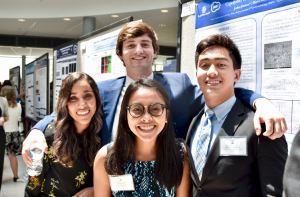
Johns Hopkins Career, Academic, and Research Experiences for Students (CARES) Summer Symposium was launched in 2014 through the collaboration of 10 summer programs. This annual symposium brings together graduate, undergraduate and high school students who have participated in one of the Johns Hopkins CARES summer programs to showcase diverse STEM talent.
We welcome you to come to the event and see all the hard work done by our PS-OC intern Stephanie Lux and by Nanotechnology for Biology and Bioengineering Research Experience for Undergraduates (REU) program interns that are working on PS-OC research.
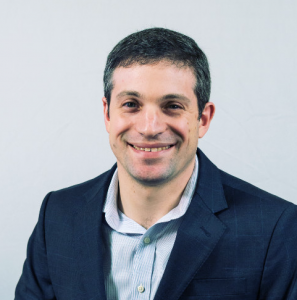
We are pleased to welcome our last guest speaker in our Summer Seminar Series, David Sebba, PhD from BD. David Sebba will be presenting, “Developing a Career in Industry.”
Dave Sebba is an Associate Principal Scientist, R&D Innovation at BD’s Diagnostic Systems business. Dave partners with Business Development, R&D, and business leaders to identify and assess new technologies and business opportunities and set strategic priorities.
Dave joined BD in 2012 where he had roles ranging from Staff Scientist to Senior R&D Manager. As Senior R&D Manager, Dave led teams focused on developing technologies in the microbiology, immunoassay, and clinical chemistry spaces, often working closely with key external collaborators and clinical sites to demonstrate technology performance in the field.
Prior to joining BD, Dave worked as a Program Manager / Senior Scientist at nanoComposix (San Diego, CA), a rapidly growing startup company, where he developed IVD products and OEM materials for the pharmaceutical, electronics, and cosmetics industries. He holds a PhD in materials science from Duke University and a BS in chemical engineering from Johns Hopkins University.

“Ecology Meets Cancer Biology: Keystone Cancer Cells are Actuators of Therapy Resistance and Cancer Lethality”
Using cancer ecology to solve the problem of metastasis, Amend’s research is focused on understanding the role of the tumor microenvironment in cancer progression, specifically related to lethal metastasis.
Sarah Amend is an Assistant Professor, partnering with Dr. Ken Pienta to study the ecology of cancer. She was a post-doctoral fellow in the lab and received her undergraduate degree from N.C. State University in Biological Sciences and did her Ph.D. thesis work on contributions of the microenvironment to bone resident cancer at Washington University in St. Louis. She is studying the role of the malignant cancer niche in inducing cancer cell biodiversity.
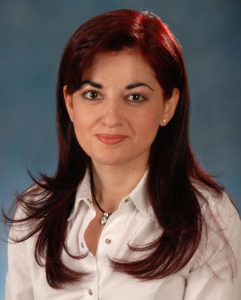
Please join us for our second guest speaker in our Women in Cancer Research Fall Mini Seminar Series, Aikaterini Kontrogianni-Konstantopoulos, and her talk, “Giant Obscurins: Novel Tumor and Metastasis Suppressors in Breast Epithelial Cells.”
Abstract: Obscurins, encoded by the single OBSCN gene, are giant (720-860 kDa) cytoskeletal proteins with scaffolding and regulatory roles. The OBSCN gene is highly mutated and/or epigenetically modified in multiple types of cancer, including breast cancer. Consistent with this, Kaplan-Meier-Plotter data sets have indicated that low OBSCN levels correlate with significantly reduced survival and relapse-free survival in breast cancer patients. Our research focuses on interrogating the impact of obscurins’ loss from normal breast epithelial cells, the delineation of the molecular alterations that take place downstream of obscurins’ loss, and the development of novel and effective ways to restore obscurin expression and/or functionality.
Biography: Aikaterini Kontrogianni-Konstantopoulos research focuses on the elucidation of the roles of cytoskeletal and membrane-associated proteins as structural and signaling mediators. Using the muscle and epithelial cell as model systems, my laboratory has pioneered the molecular and functional characterization of the obscurin subfamily and its binding partner Myosin Binding Protein-C slow in health and disease.
In 2007, she joined the Department of Biochemistry and Molecular Biology at the University of Maryland School of Medicine as Assistant Professor in the tenure track. Using the muscle and epithelial cell as model systems, her laboratory has pioneered the molecular and functional characterization of major cytoskeletal and membrane-associated proteins as structural and signaling mediators in health and disease.


